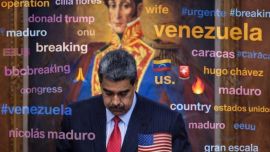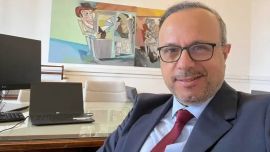The imposing figure of former Brazil president Luiz Inácio Lula da Silva will cast a long shadow over his nation tomorrow as Brazilians head to the polls to cast their ballots for their next president, with the iconic leader’s influence as inescapable in the voting booth as it has been during a high-stakes, controversial and oftentimes surreal election campaign.
Though Lula has been in prison since April, the saga of his on-off candidacy made this one of the most unpredictable races in memory, until he was ruled out of the running in August.
On Friday, the latest surveys from polling firms showed far-right-winger Jair Bolsonaro leading the race, ahead of Lula’s anointed candidate, ex-São Paulo mayor Fernando Haddad.
Lula’s 12-year conviction for accepting a bribe – a crime which he denies – disqualified him from running for office due to Brazil’s “clean slate” law. After exhausting his legal appeals unsuccessfully, he finally admitted defeat and named the relatively unknown Haddad to replace him as the Workers’ Party (PT) candidate in the October elections.
Lula, a 72-year-old former metal factory worker, fought so long and hard to try to win a third presidential mandate – following a largely successful previous stint from 2003-2010 –that he left Haddad little time to campaign solo.
While many denounced Lula’s stubborn fight as an “ego trip,” it may pay off in the end, as Haddad’s chances don’t seem to have been harmed in the slightest by his 11th-hour inclusion on the ballot.
The latest polls show him second to right-wing frontrunner Bolsonaro with 22 percent in the October 7 first round – but they also predict he would just about defeat the ex-Army captain in a run-off on October 28.
‘MASTER OF TIMING’
“The master of timing in this campaign has been Lula,” insisted Gaspard Estrada, a Latin America specialist at the Institute of Political Studies (Sciences-Po) in Paris. “It is by maintaining his candidacy that he managed to place the PT at the centre of the game. From his cell in Curitiba, he played a key role.”
Other parties were left hanging for months, waiting to find out if Lula would run, with the centre-right suffering the most adverse effects as it “took a huge amount of time to define its strategy of alliances.”
And even behind bars, Lula’s charisma has the power to incite passions.
He left office in 2010 with record approval ratings in an emerging economy enjoying unprecedented growth.
He maintains great appeal on the left but has many enemies, from the centre to the far-right. They blame the PT, which has won the last four presidential elections, for Brazil’s current political, economic and security woes. In addition, both Lula and his hand-picked successor, Dilma Rousseff, have been caught up in the wide-ranging Operation Lava Jato (“Car Wash”) corruption probe.
If elected, Haddad says he will continue the programme set out by his iconic party leader, whom he regularly visits in jail.
That loyalty has been mocked by centre-left candidate Ciro Gomes, of the Democratic Labour Party (PDT),who quipped that Haddad would be a president “who goes to consult his mentor at every crisis.”
Should Haddad win, Lula is more than likely to play a key role in running the country, despite his incarceration.
Few expect him to serve his entire 12-year sentence behind bars. In April 2020 he will qualify for semi-open incarceration, meaning he would only need to spend the night in prison. Two years after that, and before the next president’s term comes to an end, he could be transferred to house arrest.
‘THE LAW WILL DECIDE’
But at the same time, as of early next year the Supreme Court could review his sentence and even extend it, while he is also the subject of another five court cases, meaning further convictions are possible.
“What will decide” Lula’s political future “is what the law does with him,” said Christophe Ventura, a researcher at the Institute for Research on Innovation and Science.
What won’t happen though, is Haddad using the president’s right to pardon to free Lula. “Lula is not going to abandon the defence of his innocence. He’s the first to say: ‘I don’t want favours, I want the Brazilian courts and international forums to recognise that I was the victim of a judicial error’,” Haddad recently told CBN radio and the G1 website.
Estrada, though, has “no doubt” Lula would “play a central role as Haddad’s consultant,” whether formally or not.
As for Lula being named in a Haddad government, “theoretically that’s a possible scenario but it’s certainly a red line that mustn’t be crossed for a large part of Brazilian society,” says Ventura.
Haddad would have enough problems managing “really difficult conditions” in a country mired in crippling debt, with feeble growth and 13 million unemployed that “he couldn’t allow himself to bring into the government the object of all Brazil’s passions.”
Whatever happens in the elections, “Lula will continue to exert his moral duties” over society, insists Ventura.
DIVISION
An ultraconservative candidate with polarising appeal, Bolsonaro, has surged in polls leading up to the vote, heightening emotions and social divisions.
On Wednesday – four days before the election – Bolsonaro was seen with 32 percent of voter intentions after rising four percentage points since last week, according to the survey firm Datafolha. Other pollsters, including Ibope, confirmed that ascent.
That puts Bolsonaro well ahead of the 21 percent credited to his nearest rival, Haddad. But the final outcome, likely to be decided by a run-off election October 28 if no candidate gets more than 50 percent of valid ballots in the first round, is still far from certain. A duel between Bolsonaro and Haddad would see a 44-42 percent split, according to Datafolha – too close to call given the two-point margin of error.
Bolsonaro, however, has predicted the run-off won’t be necessary, saying he believes he will win in the first round.
“Last week I would have called it impossible. But today I think he [Bolsonaro] has a real chance of winning right from the first round. It’s not the most likely scenario, but it’s possible,” said Sérgio Praça, a political science professor at the Getúlio Vargas Foundation.


























Comments